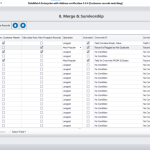We can never underestimate the value of data to the success of any business. The increased use of big data leads generation and analytics has led to the development of new ways to track interactions between businesses and customers, provide higher quality products and services, boost revenue, and improve brand efficiency. But, perhaps one of the most important uses of data lies … [Read more...] about How Big Data Plays A Vital Role In Business Lead Generation
Big Data
Learn everything you need to know about big data. Find out how companies are using this revolutionary technology and what it means for your business strategy.
I Don’t Care How Big Your Data Is
At some point in the last two decades, the size of our data became inextricably linked to our ego. The bigger the better. We watched enviously as FAANG companies talked about optimizing hundreds of petabyes in their data lakes or data warehouses. We imagined what it would be like to engineer at that scale. We started humblebragging at conferences, like weight lifters talking … [Read more...] about I Don’t Care How Big Your Data Is
Autonomous data observability and quality within AWS Glue Data Pipeline
Data operations and engineering teams spend 30-40% of their time firefighting data issues raised by business stakeholders. A large percentage of these data errors can be attributed to the errors present in the source system or errors that occurred or could have been detected in the data pipeline. Current data validation approaches for the data pipeline are rule-based - designed … [Read more...] about Autonomous data observability and quality within AWS Glue Data Pipeline
Importance of Data Cleansing: 6 Reasons Why the Quality of Data Matters
Data quality is the foundation of many critical business decisions, processes, and functions. For instance, customer experience, analytics, campaign management, reporting, etc., are only possible with good quality data. Keeping a check on the quality of data is, therefore, an important function for organizations regardless of their sizes. This article highlights 6 significant … [Read more...] about Importance of Data Cleansing: 6 Reasons Why the Quality of Data Matters
How To Merge Purge Large Databases
An average enterprise uses 464 custom applications to digitize its business processes. But when it comes to generating useful insights, the data residing at disparate sources must be combined and merged together. Depending on the number of sources involved and the structure of data stored in these databases, this can be quite a complex task. For this reason, it is imperative … [Read more...] about How To Merge Purge Large Databases
What is big data?
Big data is a term that refers to the massive amount of digital data created and shared every day. Big data can transform how we live, work, and communicate. It can be used to improve everything from public health and urban planning to business and marketing.
Big data is also changing the way we think about privacy and security. The volume, velocity, and variety of big data present challenges and opportunities for organizations and individuals. Regardless, big data is here to stay, and its impact will only continue to grow in the years to come.
What is big data analytics?
Big data analytics is the process of turning large, complex data sets into actionable insights. Businesses use various analytical tools and techniques, including machine learning and statistical analysis, to do this.
Big data analytics can be used to improve decision-making in areas like marketing, operations, and customer service. It can also be used to identify new business opportunities and optimize existing processes. With the help of big data analysis, businesses can gain a competitive edge by using their data better.
Want to learn more about big data? Datafloq has courses available. Contact us to get started.
When was big data introduced?
The term big data was coined in the 1990s, with some giving credit to John Mashey for popularizing the term. However, the concept of big data has been around for much longer.
Where does big data come from?
In the early days of computing, scientists and businesses began to realize that the amount of data being generated was increasing exponentially. As a result, they began to develop new methods for storing and processing data.
Over time, these methods have become increasingly sophisticated and have played a key role in enabling businesses to make sense of vast amounts of information. Today, big data is used in various industries, from retail to healthcare, and its importance is only likely to grow in the years to come.
What are examples of big data?
One of the most common examples of big data is social media data. With over 2 billion active users, Facebook generates a huge amount of data every day. This includes information on user interactions, posts, and even location data. Analyzing this data can help companies better understand their customers and target their marketing efforts.
Another example of big data is GPS signals. These signals are constantly being generated by devices like cell phones and fitness trackers. When combined with other data sets, GPS signals can be used to provide insights into everything from traffic patterns to human behavior. Finally, weather patterns are another type of big data set. By tracking these patterns over time, scientists can better understand the impact of climate change and develop strategies for mitigating its effects.
How do companies use big data?
Companies use big data in marketing, product development, and customer service. By analyzing large data sets, businesses can identify patterns and trends that would be otherwise difficult to spot. For example, a company might use big data to track customer behavior patterns to improve its marketing efforts.
Alternatively, a company might use big data to improve its products by identifying areas where customers are most likely to experience problems. For instance, big data can be used to improve customer service by finding pain points in the customer journey. Ultimately, big data provides companies with a valuable tool for gaining insights into their business operations.







